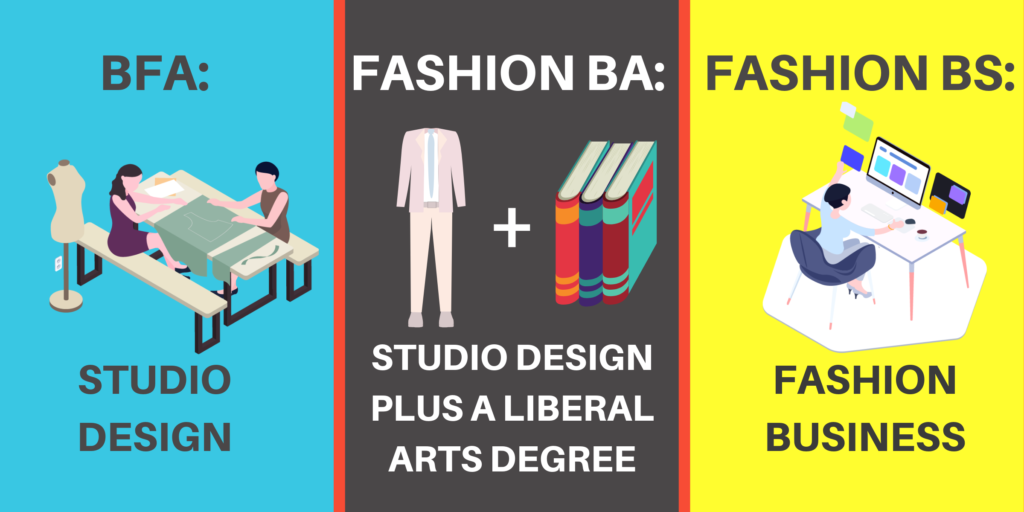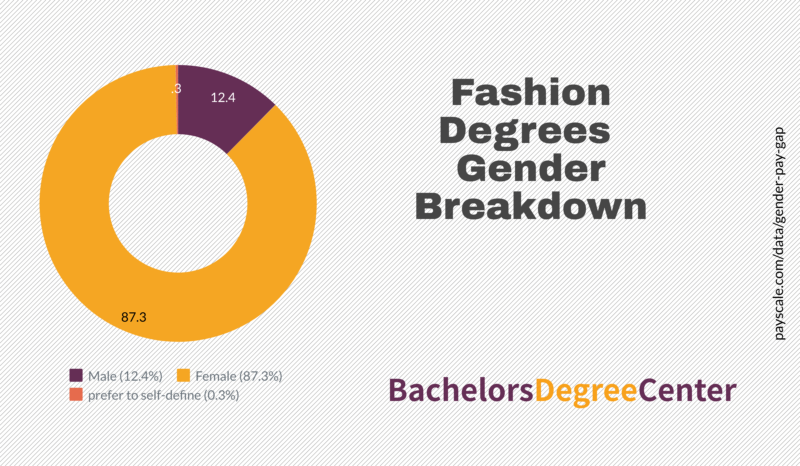With a fashion degree, you can pursue careers in design, merchandising, marketing, and fashion journalism. Opportunities also exist in retail management and trend forecasting.
A fashion degree opens doors to a vibrant and dynamic industry. Graduates can find roles in various sectors, including design houses, retail stores, and media outlets. They can work as fashion designers, creating new trends and styles. Merchandising experts manage product lines and inventory.
Marketing professionals promote brands and analyze consumer behavior. Fashion journalists write for magazines, blogs, and other media, providing insights into trends and industry news. Retail managers oversee store operations, ensuring profitability and customer satisfaction. Trend forecasters predict future fashion movements, helping companies stay ahead. A fashion degree offers a wide array of exciting career paths.

Fashion Designer
A fashion designer creates clothing, accessories, and footwear. They blend creativity with practical skills to craft unique designs. Fashion designers often set trends and influence global fashion.
Role And Responsibilities
Fashion designers have a wide range of responsibilities. Here are some key tasks:
- Sketching new designs
- Choosing fabrics and materials
- Overseeing the production process
- Collaborating with other designers and teams
- Presenting collections at fashion shows
Skills Needed
To succeed as a fashion designer, certain skills are essential:
- Creativity: Think outside the box and innovate.
- Technical Skills: Understand fabrics and garment construction.
- Attention to Detail: Focus on small elements.
- Communication: Collaborate effectively with teams.
- Business Acumen: Market and sell your designs.
Career Prospects
Fashion designers have many career opportunities. Some potential paths include:
| Job Title | Description |
|---|---|
| Fashion Designer | Designs clothing and accessories. |
| Textile Designer | Creates fabric patterns and prints. |
| Fashion Buyer | Selects products for retail stores. |
| Costume Designer | Designs costumes for film and theater. |
Fashion designers can also start their own labels. This provides complete creative control. There is room for growth and recognition in the industry.

Fashion Merchandiser
Are you passionate about fashion and wondering how to use your fashion degree? Consider becoming a Fashion Merchandiser. This role blends creativity and business skills, making it a dynamic career choice.
Job Overview
A Fashion Merchandiser works to ensure that retail stores have the right products. They decide what clothes and accessories will be in stores. They also work on pricing, display, and promotion strategies.
This role often involves analyzing market trends and customer preferences. You will work closely with designers, suppliers, and sales teams.
Key Skills
- Analytical Skills: Understanding market trends and sales data.
- Creativity: Designing attractive displays and promotions.
- Communication: Working with designers and suppliers.
- Negotiation: Getting the best deals from suppliers.
- Attention to Detail: Ensuring product quality and proper pricing.
Career Growth
The career path for a Fashion Merchandiser can be rewarding. You may start as an assistant merchandiser and work your way up. Here is a typical career progression path:
- Assistant Merchandiser
- Merchandiser
- Senior Merchandiser
- Merchandising Manager
- Director of Merchandising
With experience, you can even become a Chief Merchandising Officer (CMO).
Working in fashion merchandising offers many opportunities to grow. The field is dynamic and constantly evolving. If you love fashion and have a knack for business, this could be the perfect career for you.
Fashion Buyer
Are you passionate about fashion and have a keen eye for trends? A career as a Fashion Buyer might be perfect for you. Fashion buyers play a crucial role in the retail industry. They select and purchase the latest trends for stores.
What They Do
Fashion buyers determine which items will be sold in stores. They analyze market trends and customer preferences. They negotiate with suppliers to get the best deals. Fashion buyers also manage inventory and ensure products arrive on time.
They travel to fashion shows and trade fairs. They meet with designers and manufacturers. This helps them stay ahead of trends and find unique pieces.
Essential Skills
- Analytical Skills: They analyze sales data to forecast trends.
- Negotiation Skills: They negotiate prices and contracts with suppliers.
- Trend Awareness: They stay updated with the latest fashion trends.
- Communication Skills: They communicate with team members and suppliers.
- Budget Management: They manage budgets to maximize profits.
Future Opportunities
With experience, fashion buyers can advance to higher roles. They might become senior buyers or purchasing managers. Some may start their own fashion businesses.
The fashion industry is ever-evolving. New trends and technologies create new opportunities. Fashion buyers with digital skills can leverage e-commerce platforms. They can explore roles in online retail management.
| Role | Potential Career Path |
|---|---|
| Assistant Buyer | Entry-level position |
| Junior Buyer | Gains experience and responsibility |
| Senior Buyer | Manages major accounts |
| Purchasing Manager | Oversees buying team |
Fashion Stylist
A Fashion Stylist helps people look their best. They choose outfits for clients. This role is both creative and rewarding. It involves working with clothes, accessories, and more.
Daily Tasks
Fashion Stylists have various tasks each day. These tasks include:
- Meeting clients to understand their style.
- Selecting outfits for events or photoshoots.
- Organizing wardrobe and accessories.
- Shopping for new fashion items.
- Collaborating with designers and photographers.
- Keeping up with fashion trends.
Important Skills
To be a successful Fashion Stylist, you need certain skills:
- Creativity: Think outside the box for unique looks.
- Communication: Understand client needs and express ideas clearly.
- Organization: Manage wardrobe and schedule efficiently.
- Fashion Knowledge: Stay updated with trends and brands.
- Attention to Detail: Notice small details in outfits.
Career Path
A Fashion Stylist can follow different career paths. Here’s a simple guide:
| Stage | Description |
|---|---|
| Entry-Level | Work as an assistant to experienced stylists. |
| Mid-Level | Style for smaller brands or independent projects. |
| Senior-Level | Lead styling for major brands or celebrities. |
| Expert-Level | Open your own styling business or consultancy. |
A career as a Fashion Stylist can be very fulfilling. It combines creativity with fashion knowledge. This role allows you to make people feel confident and stylish.
Textile Designer
A fashion degree can open doors to many creative careers. One exciting path is becoming a textile designer. This role allows you to create unique fabrics that shape the fashion world. Let’s explore what this job entails.
Work Description
A textile designer creates patterns for fabrics. These fabrics are used in clothing, home goods, and accessories. They use various techniques like weaving, knitting, and printing. The designs can be for both functional and decorative purposes.
Textile designers often work with fashion designers. They ensure the fabric matches the vision of the clothing line. They also work with manufacturers to produce the fabric. This job blends artistry with technical skills.
Required Skills
To excel as a textile designer, you need specific skills. Here are some essential ones:
- Creativity: Design unique and appealing patterns.
- Technical Knowledge: Understand weaving, knitting, and printing techniques.
- Attention to Detail: Ensure patterns are precise and flawless.
- Software Skills: Use design software like Adobe Photoshop and Illustrator.
- Color Theory: Choose colors that enhance the design.
Job Outlook
The demand for textile designers is growing. With a rise in fashion brands and home decor items, opportunities are plentiful.
According to the Bureau of Labor Statistics, jobs for textile designers are expected to grow by 3% from 2020 to 2030.
Working as a textile designer can be fulfilling and lucrative. With the right skills and creativity, you can make a significant impact in the fashion industry.

Fashion Marketing
Fashion marketing is an exciting field. It blends creativity with business strategies. It plays a crucial role in promoting fashion brands. From managing campaigns to analyzing trends, fashion marketers do it all.
Role Overview
A fashion marketer’s job involves promoting brands and products. They create strategies to attract customers. They work with designers, retailers, and advertisers. Their goal is to boost sales and brand awareness.
Fashion marketers also analyze market trends. They study consumer behavior. They use this data to plan effective marketing campaigns. They manage social media, create ads, and plan events.
Crucial Skills
Fashion marketers need several key skills. Here are the most important ones:
- Creativity: They must think outside the box.
- Communication: Good communication is vital for working with teams.
- Analytical Thinking: They need to understand market trends.
- Social Media Savvy: They should know how to use social media effectively.
- Project Management: They must manage multiple tasks efficiently.
Advancement Opportunities
Fashion marketers have many advancement opportunities. They can move up to higher positions like:
- Marketing Manager: Oversee the entire marketing department.
- Brand Manager: Focus on maintaining and growing a brand.
- Digital Marketing Specialist: Specialize in online marketing.
- Public Relations Manager: Handle media and public interactions.
Fashion marketing offers a dynamic and rewarding career path. It allows you to combine creativity with strategic thinking. With the right skills, you can achieve great success.
Fashion Pr Specialist
A career as a Fashion PR Specialist offers exciting opportunities. This role combines fashion knowledge with public relations skills. Let’s explore what you can do with this degree.
Job Description
A Fashion PR Specialist manages the public image of fashion brands. They create press releases, plan events, and network with media. Specialists build strong relationships with influencers and journalists. Their goal is to generate positive coverage for fashion brands.
Key Competencies
To succeed as a Fashion PR Specialist, you need certain skills:
- Communication Skills: Write clear and engaging press releases.
- Networking: Build relationships with media and influencers.
- Event Planning: Organize fashion shows and brand events.
- Creativity: Develop unique promotional strategies.
- Social Media Savvy: Use platforms to boost brand visibility.
Career Prospects
The demand for Fashion PR Specialists is growing. You can work for fashion brands, PR firms, or as a freelancer. Entry-level positions start as PR assistants. With experience, you can become a senior PR specialist or PR manager.
Fashion PR Specialists enjoy varied and dynamic careers. They have the chance to travel, attend fashion events, and meet industry leaders. This makes the career both rewarding and exciting.
Fashion Journalist
A Fashion Journalist explores the glamorous world of fashion. They write captivating stories about trends, designers, and events. This role blends creativity with deep industry knowledge.
Role And Duties
Fashion Journalists write articles for magazines, websites, and newspapers. They attend fashion shows and interview designers. They also review collections and predict trends. Their work keeps the public informed about the latest in fashion.
- Writing articles and reviews
- Interviewing fashion designers and models
- Attending fashion shows and events
- Researching fashion trends
Necessary Skills
Successful Fashion Journalists need excellent writing skills. They must understand fashion deeply. Networking is key for exclusive stories. Attention to detail helps in accurate reporting. They also need to work under tight deadlines.
| Skill | Description |
|---|---|
| Writing | Crafting engaging and error-free articles. |
| Fashion Knowledge | Understanding trends and industry history. |
| Networking | Building connections for exclusive stories. |
| Attention to Detail | Ensuring accuracy in reporting. |
Career Path
A Fashion Journalist often starts as an intern or assistant. They might write for smaller blogs or magazines at first. Over time, they can become senior writers or editors. Some even become famous for their unique voice and style.
- Internship or Assistant Role
- Junior Writer
- Senior Writer
- Editor or Chief Editor
- Renowned Fashion Journalist
Frequently Asked Questions
What Jobs Can I Get With A Fashion Degree?
A fashion degree opens doors to various careers. You can work as a designer, stylist, merchandiser, or fashion marketer.
Is A Fashion Degree Worth It?
Yes, a fashion degree is valuable. It provides skills and connections crucial for a successful career in the fashion industry.
Can I Become A Fashion Buyer?
Yes, with a fashion degree, you can become a fashion buyer. This role involves selecting and purchasing products for retail.
What Skills Do Fashion Graduates Need?
Fashion graduates need creativity, an eye for detail, and strong communication skills. Business acumen and trend awareness are also essential.
Conclusion
A fashion degree opens many doors in the industry. Careers range from design and marketing to merchandising and retail. With creativity and passion, your opportunities are limitless. Whether you dream of starting your own line or working for top brands, a fashion degree can set you on the right path.
